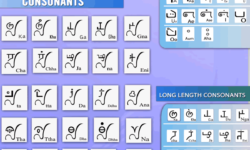Profile
Yerukula is one of nearly twenty scripts created by Dr. Prasanna Sree for indigenous and minority groups, mostly in Andhra Pradesh. In each case, the design of the script reflects some iconic feature of the culture of that linguistic community. She writes:The Yerukulas are the predominant tribal group found in the plain areas of the states of Andhra Pradesh and Telangana. Yerukulas are mainly pig-rearers and basket makers who live in mixed villages maintaining symbiotic relations with non-tribal groups.
Yerukula is a Dravidian language spoken by about 70,000 people in parts of Andhra Pradesh in India. The language is also known as Kurrubasha or Kulavatha and is closely related to Ravula and Irula, and more distantly related to Tamil. The Yerukula people call themselves Kurru: the name Yerukula comes from their women’s traditional profession of fortune telling (erukacheputa).
The Yerukula tribe is divided into a number of functional and endogamous sub-divisions and each sub-division is named after the commodity they trade in the occupation they have adopted. The sub-divisions are Yaddala Yerukula (agricultural cultivators), Dabba Yerukula (those who make baskets from split bamboo), Yeethapullala Yerukula (those who baskets from wild date leaves), Kunchapuri Yerukula (those who make weaver’s combs), Parikamuggula Yerukula (soothsayers and beggars), Karivepaku Yerukula (hawkers of curry leaves), and Uppu Yerukula (salt hakwers).
The type of family among Yerukula tribe is usually nuclear. Descent is patrilineal, residence is patrilocal and authority is patriarchal. Cross-cousin (menarikam) marriages are preferred. Marriages between the maternal uncle and niece are also permitted. Monogamy is the common form of marriage, but polygyny is also socially permitted. Marriage through negotiation and exchange are the common modes of acquiring mates. Traditionally, the married women used to wear a bead necklace as the symbol of marriage, but now thalibottu or mangalasutram is being worn as a marriage symbol by most women. Divorce is permissible on account of adultery, barrenness and incompatibility between the spouses. Widows are permitted to re-marry.
Yerukulas worship the Hindu benevolent gods, that is, Lord Venkateswara, Narasimhaswamy, Narayanaswami and Rama. The Yerukula celebrate Hindu festivals such as Sankranthi, Sivarathri, Sreeramanavami, Dusserah, and Ugadi (Telugu New Year’s Day).
The Yerukula tribe has its own social control mechanism at each habitation of the Yerukulas to ensure proper observance of the prescribed codes of conduct. This traditional council (Kula Panchayat) is headed by an elderly man whose office is traditionally hereditary. The Kula Panchayat try and decide the domestic disputes, disputes relating to theft, adultery, loans, property and land. The characteristic feature of deciding guilt or innocence of an accused among Yerukulas was through trial and ordeal, which was in vogue till recent times such as 1) dipping of fingers in boiling oil, 2) picking up the burnt iron crow bar, and 3) walking barefoot through the fire bed.
Apart from solving disputes, the Kula Panchayat is also empowered to maintain the solidarity of the community by checking the behavior of the individuals. If a person commits the breach of a taboo like incest, he is excommunicated and is denied all community rights. The defaulter is readmitted into the community after the purificatory ceremony is observed.
Yerukulas are non-vegetarians. Rice is their staple cereal in coastal Andhra Pradesh, while jowar is the staple cereal in Rayalaseema and Telangana regions.
The common design feature of the Yerukula script is divided in two segments. Part one is in the shape of a basket rim. The traditional occupations of the Yerukula include basket-weaving, mat-weaving, and rope-making. The Yerukula women specialize in soothsaying and fortune telling. They generally carry a basket with a musical instrument made out of a dried pumpkin shell, and take rice in return for their prophecy.
The lower part represents the bow of the great archer Ekalavya who, despite being humiliated for his lower-caste birth, remained humble, an example to his people.
You can help support our research, education and advocacy work. Please consider making a donation today.


